Never underestimate the cover letter. Serving as a complement to the resume, around 83% of hiring managers still read cover letters most of the time, if not always.
Medical employers often look beyond the qualifications found even in a good resume.
They’ll also search for applicants who show passion, professionalism, and dedication as strong as their clinical skills.
A nursing cover letter is your chance to set that tone.
In this guide, we’ll walk you through the ways to write an effective nursing cover letter, along with examples and practical tips to help you make one that gets results.
Key Takeaways
- A nursing cover letter usually follows a standard structure, while also highlighting your clinical skills, relevant experience, and personal qualities.
- The cover letter should be tailored to each hospital or clinic and include examples that show your impact on patients and teams.
- A cover letter is still relevant for applications in the medical field, as it gives recruiters insight into your character and professional approach that a resume doesn’t convey.
- For an effective cover letter, mirror the language used in the job posting, show your personality, quantify achievements (don’t be vague), and keep your paragraphs concise. Use tools like a resume builder for optimized drafts, and grammar checkers and word counters to refine.
Why Nurses Need a Cover Letter
It’s easy to think that a resume is good enough when applying for nursing jobs. But compared to a resume, a cover letter gives recruiters more of a sense of who you are (or will be) as a nurse.
Here are reasons why nurses need a cover letter:
- Shows your personality: Roughly 74% of recruiters read cover letters to see if an applicant’s personality fits the role and team. A cover letter lets you show quality traits like empathy, patience, and teamwork.
- Ties your experience to the job: Instead of repeating what’s on your resume, you can explain how your background connects to the unit, hospital, or type of patients you want to serve.
- To stand out from the crowd: Lots of applicants have similar credentials. A thoughtful letter helps your job application stand out.
- Proves professionalism: Polished writing shows that you have attention to detail, which many look for in the field.
- Explains transitions: Whether you’re a fresh graduate, changing specialties, or coming back after a break, a cover letter lets you tell your story.
Remember that the medical field is built on trust, compassion, and communication, so providing them with extra context through your cover letter is worthwhile.


Never Worry About AI Detecting Your Texts Again. Undetectable AI Can Help You:
- Make your AI assisted writing appear human-like.
- Bypass all major AI detection tools with just one click.
- Use AI safely and confidently in school and work.
Structure of a Nursing Cover Letter
A nursing cover letter has a simple format, and like any other cover letter, there’s a general structure to follow:
- Header: Found at the top, this is where you include your name, contact information, the date, and the employer’s details. This keeps your letter organized.
- Greeting: Address the letter to the hiring manager whenever possible.
- Opening paragraph: Start strong. Mention the position you’re applying for and a brief reason why you’re interested. Show you’re excited for the role and workplace.
- Body paragraphs: Here, you connect your nursing experience, training, and personal qualities to the job. Highlight specific skills (like patient care, teamwork, or specialized experience) and explain how they apply to the unit or organization.
- Closing paragraph: Wrap up confidently. Thank the reader for their time and restate your interest. To show initiative in moving forward, you can also insert a call to action (like inviting them to contact you for an interview).
- Signature: End with a polite sign-off (like “Sincerely”) followed by your name.
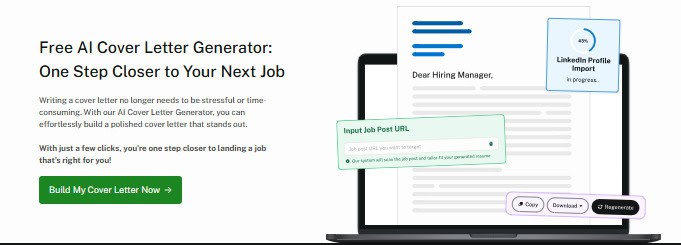
Starting a nursing cover letter from scratch can feel intimidating.
Whenever you feel stuck, use the Undetectable AI Cover Letter Generator to create a polished, professional cover letter that captures attention within seconds.
You have two options: manually fill in your personal details and job-specific information, or simply import your LinkedIn profile.
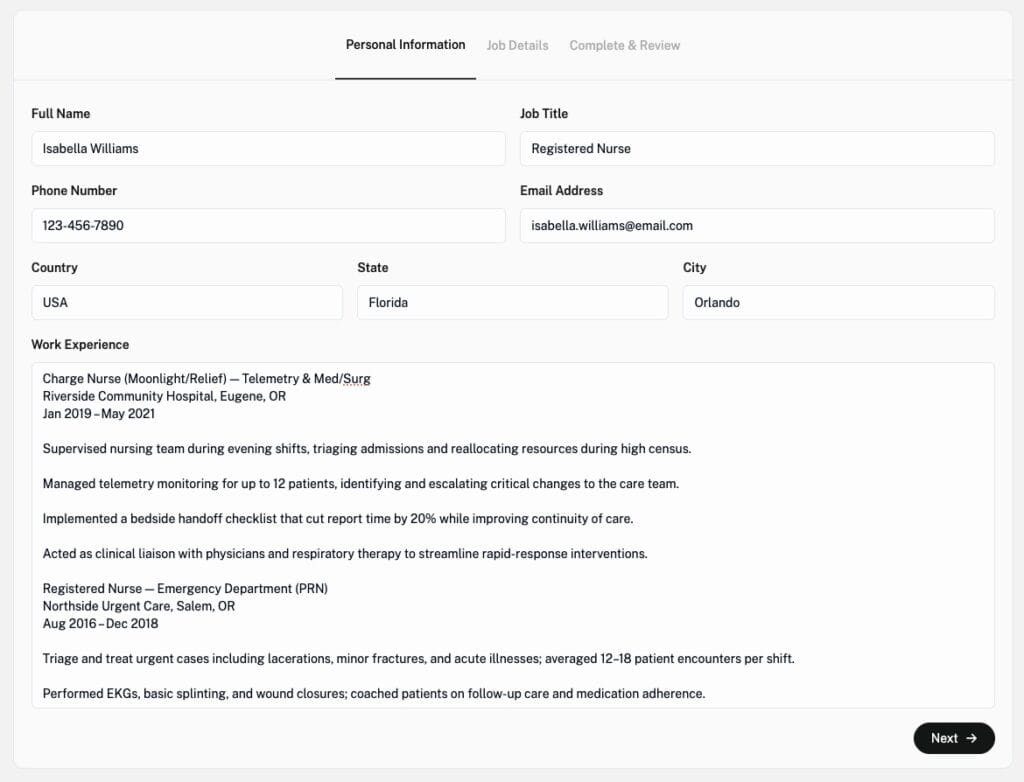
Our advanced AI then builds a tailored cover letter that highlights your skills and experience in a way hiring managers want to see.
With our HR-approved templates, every cover letter is made to put your application at the top of the pile.
And once your draft is ready, you can fine-tune the design, make small edits to the content, and download it in the format you need.
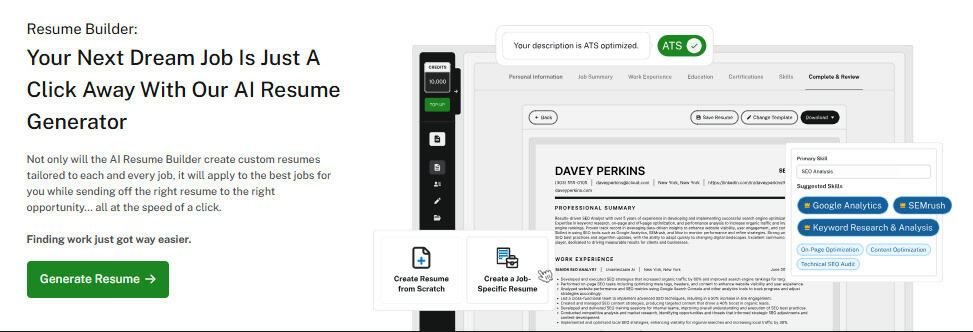
If you think your resume could use some refining, too, use the Undetectable AI Resume Builder.
It uses the same AI Humanizer technology that Undetectable’s known for to make sure your resume reads naturally and passes both recruiters’ eyes and Applicant Tracking Systems (ATS).

Just enter your personal details, experience, education, skills, and professional summary. Then, choose from templates that match your industry and career stage.
Our builder even suggests industry-specific keywords to make your resume more impactful. You can then save your resume in multiple formats.

Once your cover letter and resume are locked and ready, let our Smart Applier do the heavy lifting.
Our AI tool won’t take your job — it’ll help you land one.
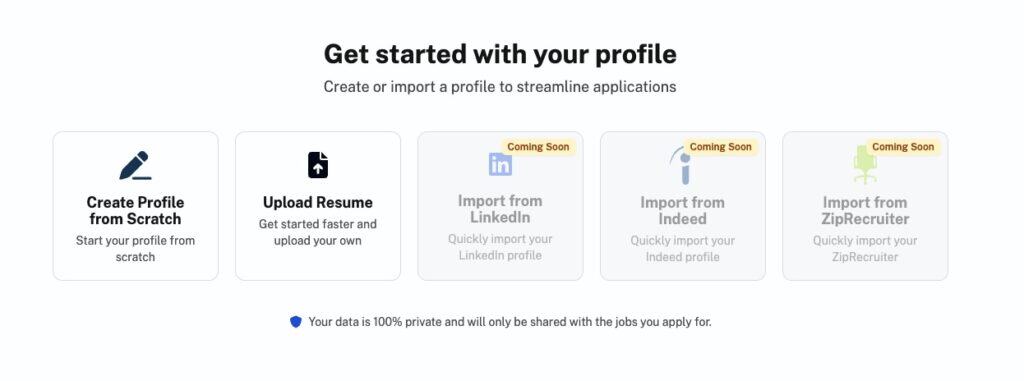
Once you’ve provided Smart Applier with your details, you can sit back as our AI works in the background.
It scans job boards across multiple platforms for roles that match your profile, tailors your documents for each opening, and can even submit applications for you automatically.
You’ll also receive instant updates on your job search so you can respond to employers ASAP and arrange interviews faster.
Job applications have never been this efficient. Give Undetectable AI a try for free!
What to Include in a Nursing Cover Letter
Knowing the structure of a nursing cover letter is one thing. Deciding what details to actually include is another.
Here’s what your nursing cover letter needs to include:
- Your contact information: Put this at the top so employers can find these details right away if they need to reach you.
- Employer details: Show professionalism by including the hiring manager’s name, title, and the organization’s information when available.
- An engaging opening: State the job you’re applying for and why it interests you. Make it clear right away that you’re looking forward to this opportunity.
- Relevant skills and experience: Highlight the nursing skills, certifications, and experiences you have that are most connected to the role. Focus on patient care, teamwork, and any specialty training.
- Personal qualities: Nursing combines clinical skills with soft skills. Traits like compassion, adaptability, and strong communication are worth spotlighting. And don’t just list these skills—explain how you embody them.
- Why this job: Share why you’re drawn to that specific hospital, clinic, or unit. This shows you’ve done your research.
Let your cover letter give you character. Adding a personal touch makes your application memorable.

Nursing Cover Letter Examples
We’ve put together sample letters that show how to highlight your skills, experience, and personality in a professional way that doesn’t come off as generic.
Use these nursing cover letter examples as a guide to shape your own.
Example 1: Fresh nursing graduate applying for an entry-level position
November 5, 2025
Nurse Recruitment Team
St. Mary’s Regional Hospital
123 Lakeview Avenue
Springfield, IL 62701
Dear Hiring Manager,
I am writing to apply for the Registered Nurse position in the Medical-Surgical Unit at St. Mary’s Regional Hospital. As a recent BSN graduate from Illinois State University, I am eager to begin my nursing career in an organization known for its commitment to quality care and community service.
Throughout my clinical rotations, I gained valuable experience in patient assessment, wound care, IV administration, and documentation. My preceptors consistently praised my ability to remain calm under pressure and communicate clearly with patients and staff. In my pediatrics rotation, I learned how to provide compassionate care to children and families, while in my medical-surgical placement, I practiced time management and prioritization in a fast-paced environment. These experiences gave me confidence in my ability to adapt and provide safe, effective care.
Alongside my degree, I worked as a Certified Nursing Assistant, where I provided daily care for patients and collaborated with multidisciplinary teams. This role taught me the importance of patience, teamwork, and empathy — qualities I bring to nursing every day.
What excites me most about St. Mary’s is your dedication to community health initiatives. I am passionate about serving diverse populations and would be proud to contribute to your mission.
Thank you for considering my application. I would welcome the chance to discuss how my training, clinical experience, and dedication to nursing can make a meaningful impact on your team.
Sincerely,
Anna Lopez, BSN
Example 2: Experienced nurse practitioner applying for a position at a new hospital
October 27, 2025
Director of Physician and Nursing Services
Riverbend Health System
420 Oakwood Drive
Columbus, OH 43215
Dear Director,
I am writing to express my interest in the Family Nurse Practitioner position at Riverbend Health System. With over eight years of NP experience in outpatient primary care, I bring a strong background in managing complex cases, leading quality initiatives, and mentoring future clinicians. I am confident my expertise and patient-first approach make me a strong candidate for this role.
At Lakeside Family Clinic, I provide comprehensive care across the lifespan, from pediatrics to geriatrics. My focus on chronic disease management, preventive health, and patient education has helped improve long-term outcomes.
In particular, I have:
- Led a diabetes management program that increased patient adherence to treatment plans by 20%.
- Introduced patient education workshops on nutrition and preventive care, improving engagement and awareness.
- Collaborated with specialists, pharmacists, and nurses to build care plans that reduced unnecessary hospital readmissions.
- Served as a preceptor for NP students and mentored new nurses, fostering a supportive clinical learning environment.
These achievements reflect my ability to balance clinical expertise with leadership, teamwork, and a focus on measurable outcomes.
Beyond direct care, I believe in creating a collaborative environment where every staff member feels supported. I have seen firsthand how strong teamwork directly impacts patient satisfaction, safety, and long-term health outcomes.
Riverbend Health System’s commitment to holistic, integrated care resonates strongly with me. I value your focus on combining evidence-based practice with compassionate service, and I am eager to bring my skills, leadership, and dedication to your team.
Thank you for considering my application. I look forward to the opportunity to discuss how my background aligns with your mission and how I can contribute to Riverbend’s continued success.
Sincerely,
Michael Tan, MSN, FNP-C
Tips for Writing a Strong Nursing Cover Letter
Don’t overdo your nursing cover letter by trying too hard to impress. Hiring managers value authenticity and clarity much more than exaggeration.
Here are some tips for writing a successful nursing cover letter:
- Echo the job description: If the job post highlights “patient-centered care” or “evidence-based practice,” use those exact phrases in your letter. Doing this shows that you understand what matters to them and you’re aligning your skills with their priorities.
- Let your personality come through: Keep it professional, but don’t write in stiff, robotic language. Write in the way you’d naturally speak in a workplace.
- Write in short sections: Hiring managers often skim. Break up your cover letter into short paragraphs or add a quick bullet list of achievements so your strongest points stand out at a glance.
- Use numbers where you can: Instead of saying you “helped improve patient education,” try to be more specific. For example, “Started a patient workshop that boosted follow-up compliance by 15%.” Hard results make your impact clear.
- Add context and don’t just copy your resume: Go beyond listing jobs and show how your past work prepared you for this specific position.
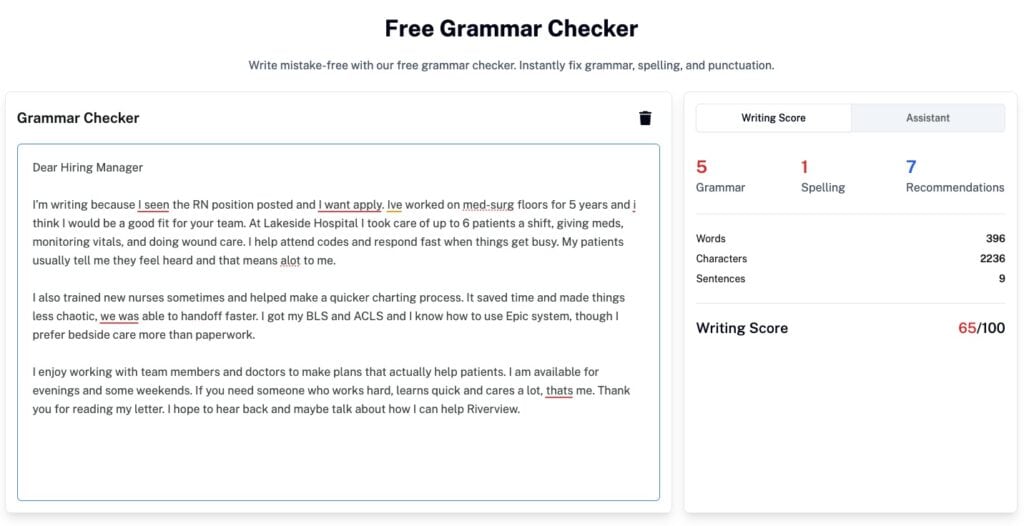
When writing your nursing cover letter, it’s easy to lean on big words or over-describe yourself and your experience.
Once you’ve written your cover letter, run it through the Undetectable AI Grammar Checker.
All you have to do is paste your text, and within seconds, our tool flags grammar, spelling, punctuation, and style issues.
With one click, you can apply the fixes you want done rather than having to edit line by line.
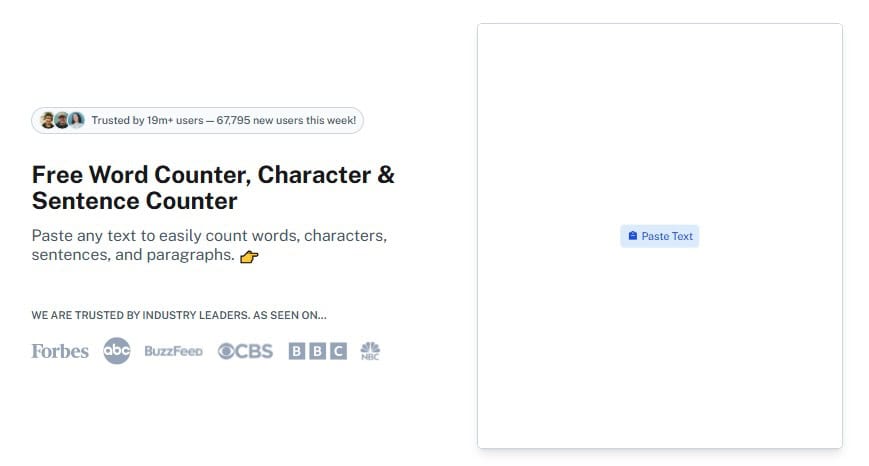
But as strong as your draft might be, you can get carried away and write too much (or maybe not enough).
Cover letter length is an important factor to consider, as you might miss key details when your letter’s too short, or get skipped entirely when it’s too long.
To stay in the sweet spot, use our Word Counter, Character & Sentence Counter.
As you draft, it keeps track of your content’s length so you stay within range and land in that recruiter-friendly zone.
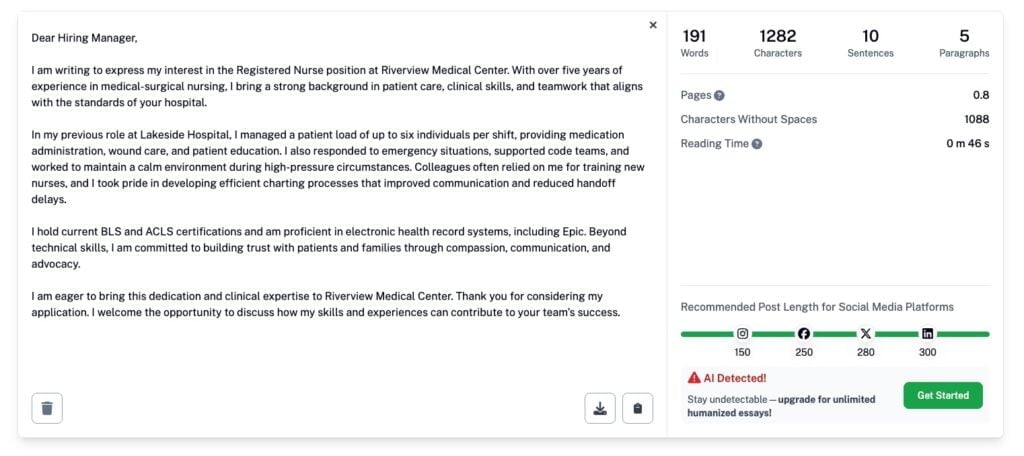
Try the AI Detector and Humanizer tools in the widget below!
FAQs About Nursing Cover Letters
Do all nursing jobs require a cover letter?
Not every posting asks for one, but sending a cover letter almost always gives you an advantage. It’s your chance to show your personality, motivation, and fit beyond what your resume lists. Even if a cover letter is optional, it’s a good idea to make one, as it can set you apart.
How long should a nursing cover letter be?
Aim for around 250–400 words, or no more than one page. This should be long enough to give context and highlight your key achievements, but also short enough that recruiters can scan quickly.
Should I mention shift flexibility or availability?
Yes, if it’s relevant. Medical employers value nurses who can cover different shifts or work specific hours. Briefly mentioning how flexible you are (without overcommitting) can strengthen your application.
Can I reuse the same cover letter for different hospitals?
Yes, but don’t copy your cover letter word-for-word. You can keep a base structure, but always customize specific details, especially those that an employer looks for, like the hospital’s values, patient population, programs, or your relevant achievements to the role.
A tailored letter shows you did your homework and truly want to work there.
Make Your Nursing Cover Letter Your Advantage
A well-written nursing cover letter can give you the edge you need in a competitive job market.
Keep it clear, specific, and tailored to the role, and you’ll immediately stand out from generic applications.
And if writing feels like a hurdle, Undetectable AI can help. From drafting to editing, our advanced tools make writing more efficient.
Add your personal touch at the end, and you’ve got a polished cover letter ready to send without spending hours on it.
Try Undetectable AI for free today. Take the stress out of writing and focus on landing the job you want.
